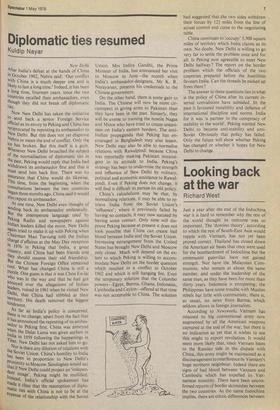New Delhi After India's defeat at the hands of China
in October 1962, Nehru said: 'Our conflict With China is a much deeper one and is likely to last a long time.' Indeed, it has been a long time, fourteen years, since the two countries recalled their ambassadors, even though they did not break off diplomatic ties.
Now New Delhi has taken the initiative to send back a senior Foreign Service official as its envoy to Peking and China has reciprocated by reposting its ambassador to New Delhi. But this does not yet disprove Nehru or mean the end of conflict. Only the ice has broken. But this itself is a gain. Whenever New Delhi broached the subject of the normalisation of diplomatic ties in the Past, Peking would reply that India had Withdrawn its ambassador first and that it roust send him back first. There was no assurance that China would do likewise. his time, from the beginning, when the consultations between the two countries began three months ago, China said it would also repost its ambassador.
At one time, New Delhi even thought of sending back its ambassador unilaterally. Rut the intemperate language used by Peking Radio and newspapers against Indian leaders killed the move. New Delhi pain tried to make it up with Peking when hairman Mao Tse-tung told the Indian charge d'affaires at the May Day reception iii 1976 in Peking that India, a great country, and China had been friends and they should resume their old friendship. But the Chinese Foreign Office remained cnol. What has changed China is still a Puzzle. One guess is that it was Chou En-lai will() was in the way and that he had got annoYed over the allegations of Indian leaders, voiced in 1961 when he visited New Delhi, that China had nibbled at their territory. His death removed the biggest hindrance.
As far as India's policy is concerned, there is no change, apart from the fact that It has announced the reposting of its ambassador to Peking first. China was annoyed ‘yhen the Dalai Lama was given asylum in ,Irt.dia in 1959 following the happenings in I Ibet. New Delhi has not asked him to go. . Nor is there any dilution of relations with t.he Soviet Union. China's hostility to India nas been in proportion to New Delhi's ,P,roximity to Moscow. Sinologists would say Idtat if New Delhi could project an 'indepenent image% Peking might be mollified. .nstead, India's official spokesman has Made it clear that the resumption of diplotnatic ties with China is not to be at the exPense of the relationship with the Soviet
Union. Mrs Indira Gandhi, the Prime Minister of India, has announced her visit to Moscow in June—the month when India's ambassador-designate, Mr K. R. Narayanan, presents his credentials to the Chinese government.
On the other hand, there is some gain to India. The Chinese will now be more circumspect in giving arms to Pakistan than they have been in the past. Simiarly, they will be averse to training the hostile Nagas and Mizos who have tried to create uneasiness on India's eastern borders. The antiI ndian propaganda that Peking has encouraged in Bangladesh may also lessen. New Delhi may also be able to normalise relations with Rawalpindi because China was reportedly making Pakistan intransigent in its attitude to India. Peking's strategy has been to undermine the strength and influence of New Delhi by military, political and economic assistance to Rawalpindi. Even if Peking does not change, it will find it difficult to pursue its old policy.
China's calculafions may be that, by normalising relations, it may be able to retrieve India from the Soviet Union's 'influence' ; where it previously failed by having no contacts, it may now succeed by having some contact. Only time will disprove Peking because at present it does not look possible that China can create bad blood between India and the Soviet Union. Increasing estrangement from the United States has brought New Delhi and Moscow only closer. Much will depend on the extent to which Peking is willing to accommodate New Delhi on the border question which resulted in a conflict in October 1962 and which is still hanging fire. Even the temporary solution that the Colombo powers—Egypt, Burma, Ghana, Indonesia, Cambodia and Ceylon—offered at that time was not acceptable to China. The solution had suggested that The two sides withdraw their forces by 121 miles from the line of actual control and come to the negotiating table.
China continues to 'occupy' 3,500 square miles of territory which India claims as its own. No doubt, New Delhi is willing to go very far to settle the problem once and for all. Is Peking now agreeable to meet New Delhi halfway ? The report on the border problem which the officials of the two countries prepared before the hostilities favours India. Can the threads be picked up from there?
The answer to these questions lies in what is the policy of China after its current internal convulsions have subsided. In the past it favoured instability and defiance of international discipline and norms. India for it was 'a partner in the conspiracy of stability in the world'. Peking wanted New Delhi to become anti-stability and antiSoviet. Obviously that policy has failed. Only the future will show whether Peking has changed or whether it hopes for New Delhi to change.


































 Previous page
Previous page